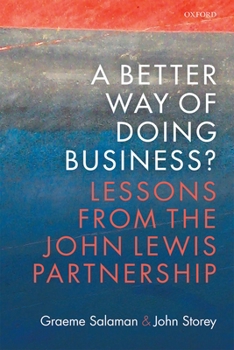A Better Way of Doing Business?: Lessons from the John Lewis Partnership
This book offers a thoroughly researched and accessibly written account of the John Lewis Partnership. It describes what the JLP is, how it works, and what other businesses can learn from it. The US/UK model of the firm, with its emphasis on shareholder value and its openness to the market in the buying and selling of businesses, is prone to a number of problematic consequences for employees, suppliers, and sometimes share-holders. The JLP represents a contrast to this model - one that has implications beyond the small niche of mutually-owned firms. The JLP has lessons for organizations that are unlikely to move towards the Partnership's distinctive shared ownership. This book identifies these lessons. The key questions addressed include: how does the JLP work in practice? What is the link between co-ownership, the JLP employment model, and the performance of the businesses? What is the role of management in the success of John Lewis and Waitrose? Are mutuality, co-ownership and business performance at odds? What is the significance of democracy within the JLP? And probably most significantly: what are the implications, for policy-makers and for economic agents of the JLP? This book is based on detailed knowledge of the JLP and its constituent business gathered by the authors over a fifteen year period. Their conclusion: that the JLP is more complex, even more impressive, and more interesting than its admirers realise.
Format:Hardcover
Language:English
ISBN:0198782829
ISBN13:9780198782827
Release Date:October 2016
Publisher:Oxford University Press, USA
Length:250 Pages
Weight:0.95 lbs.
Dimensions:0.9" x 6.0" x 9.1"
Related Subjects
Business Business & Investing Economics History Political Science Politics & Social SciencesCustomer Reviews
0 rating





